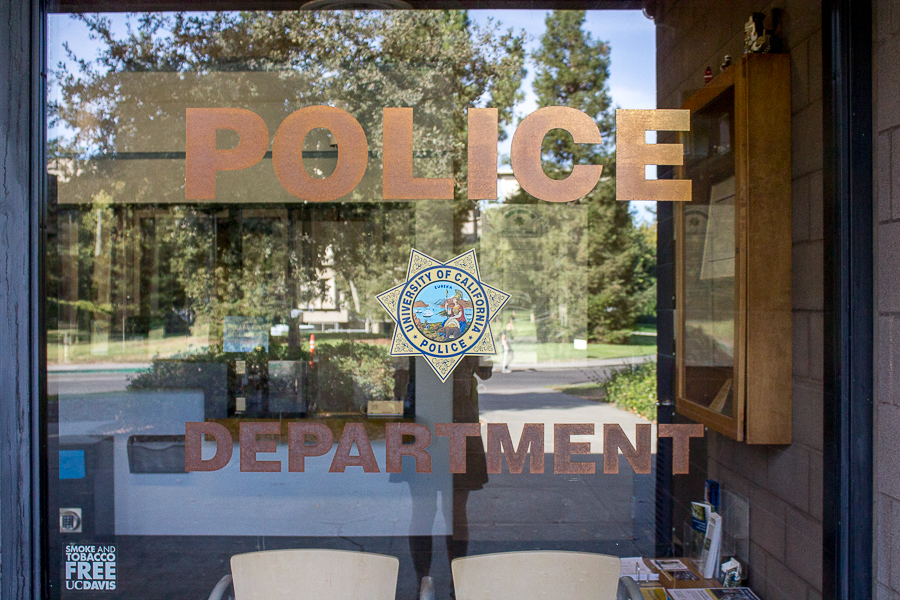
The university received reports of 28 rape cases, 15 cases of domestic violence, 54 burglaries
UC Davis released the Annual Security and Fire Safety Report to the UC Davis community via e-mail in late September. Under the federal Jeanne Clery Disclosure of Campus Security Policy and Campus Crime Statistics Act, otherwise known as the Clery Act, this report is required to be publicly released.
The data includes information on campus safety programs and summary statistics of crimes in 2015 on or around UC Davis property, which include the campus, medical center and the Sacramento branch.
The goal of the Clery Act is to ensure students, prospective students, parents and employees have access to accurate information about crimes committed on campus and campus security procedures.
UC Davis received reports of 28 cases of rape, 20 cases of fondling and one case of statutory rape in 2015. The university’s statistics also included five cases of dating violence, 15 cases of domestic violence and 22 cases of stalking.
The Clery statistics additionally reported 62 arrests for liquor offense, 38 for drug offenses and eight for weapon misdemeanor.
In 2015, UC Davis received nine cases of hate crimes: four cases of vandalism, three cases of intimidation and two assault cases.
The university also received reports on 22 cases of aggravated assault, 54 burglaries and nine auto thefts. These statistics do not include simple theft cases such as bike theft or unattended backpacks being stolen.
Compared to the 2014 Clery report, the statistics have risen in most categories of crime, including rape, domestic violence and hate crimes. Andy Fell, UC Davis associate director of media and news relations, attributes the crime increase to a higher frequency of reporting in 2015.
Reported crime can be received by police and campus security authorities, which include university employees like deans, coaches, resident assistants and faculty advisors for student clubs. UC Davis has more than 900 campus security authorities surveyed by the 2015 Clery report.
The Center for Advocacy, Resources and Education (CARE) also provides aggregate data for disclosures on sexual violence, but only with permission from the victims with their identities not disclosed.
Sarah Meredith, director of CARE, said the limitations of the Clery statistics makes the reporting inaccurate and not fully representative of the UC Davis community.
“[The Clery report] is based on geography and not on affiliation to the campus,” Meredith said. “For example, if we have a student experience a clery crime, if they experience the crime not on a UC Davis owned or leased property, then the crime will not be on it.”
Although CARE statistics can be included in the Clery report if the victim approves, Meredith also said reporting to confidential resources, like the counseling services and harassment and assistant prevention program, are not counted in the Clery report.
Safety initiatives set in place on campus that have improved in 2015 include an expansion of the Safe Rides services and the installation of the emergency call stations on campus.
According to Fell, the UC Davis Safe Ride services are the largest in the nation. The expansion includes service after Unitrans stops running and Safe Rides servicing downtown.
Many of the new blue light emergency call station installations are located in the arboretum.
“[Blue light phones] give people security and [are] a presence to discourage people,” Fell said. “It is a useful psychological tool to discourage crime and gain safety.”
Meredith said CARE is building a peer education program to do outreach to other students. In addition, CARE employees want to make programs that shift culture to support healthy relationships and communication and to eliminate victim blaming.
“[If victims] feel more supported, then they will feel more supported to go report [abuse],” Meredith said.
Martin Marquez, a third-year statistics major, said the statistics he read about did not make him feel unsafe on campus.
“I think these numbers are pretty low compared to places where I grew up,” Marquez said. “I think crime is inevitable unfortunately, but I think the university overall does a good job of responding to crime and of preventing it. Not to say it’s a utopia, but there’s only so much that can be done.”
Marquez believes increased surveillance and further extension of Safe Rides on campus will improve UC Davis crime rates.
“Many people don’t like it, but surveillance can be an effective tool for deterring crime, and for responding to it,” Marquez said. “Usually crimes happen more at night because they are easier to get away with, since it is easier to avoid witnesses. Surveillance can be that witness that helps deter crimes before they happen […] Current programs such as Safe Rides are effective and helpful, and if anything should be expanded further.”
Written by: Yvonne Leong — campus@theaggie.org



